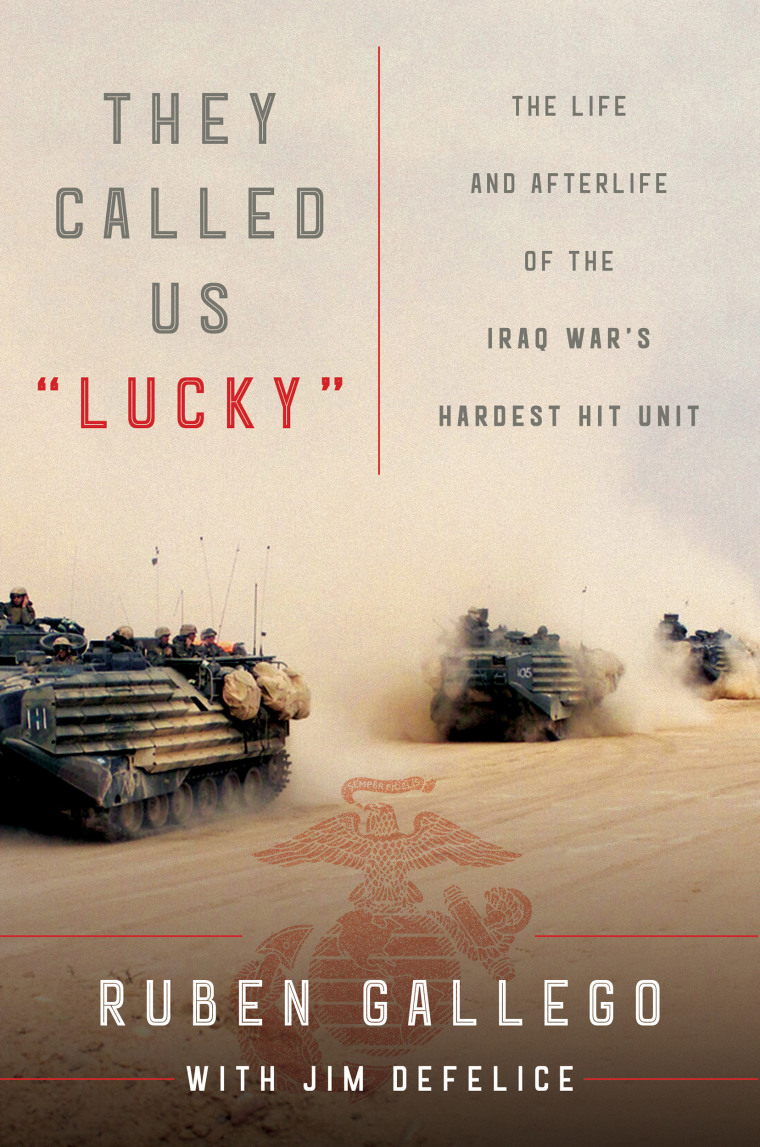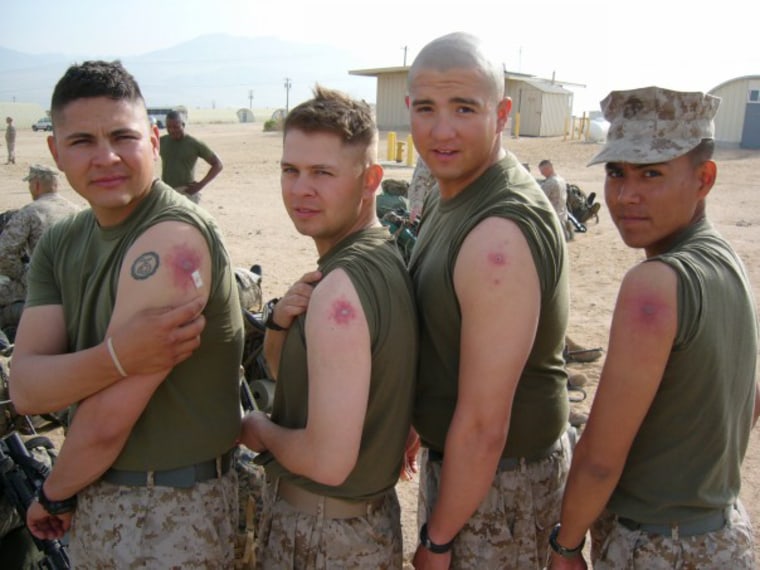On Jan. 6, as rioters pounded the doors leading to the House floor of the U.S. Capitol, Arizona Rep. Ruben Gallego sprung into action, jumping on the House furniture to urge calm, instructing those inside to keep breathing in their gas masks and guiding them to safety.
To the Democratic congressman, an Iraq veteran, they were in a war zone, he said in his newly released book.
Gallego was in Marine mode, but his mind also tossed back to the promise he had made to take care of Lance Cpl. Jonathan Grant, his best friend in Iraq — whom he couldn’t save from an improvised explosive device, or IED, attack.
“What motivated me to move was the faces of fear that I saw on the young staffers who looked like they were about to meet their death,” Gallego told NBC News this week. “It just reminded me of the young men I served with and the faces I saw in combat.”
The young faces he was reminded of, what they endured and what they lost, is what Gallego has tried to etch out in his new book, “They Called Us 'Lucky': The Life and Afterlife of the Iraq War’s Hardest Hit Unit.”

The book was finished in December, but Gallego reopened it to add the details and his thoughts on the Jan. 6 attack.
“You never know where war will find you, or where your oath as a Marine will be tested,” Gallego wrote in the book released Tuesday.
Written with “American Sniper” author Jim DeFelice, Gallego’s book is a poignant recounting of his time with the Lima Company during the Iraq War and how it went from being “Lucky Lima” —because the unit had the fewest casualties, despite weeks of combat — to being known as the unit that saw more casualties than any other in a single war.
It's an ode to his brethren in arms, those who survived the war and those who didn’t.
It’s also, for him, a cathartic step in confronting the sorrow and guilt from the war that haunt him even as he functions at the highest echelons of government.
It was the 18- and 19-year-olds going through heavy fighting led by young men in their 20s. That is war."
Rep. ruben gallego
“It is a story that should never be forgotten. This was the hardest hit unit in the Iraq War,” said Gallego, whose unit was in Iraq from March through October 2005. “It ended up, at the same time, being somewhat cathartic to me because I had to go and open up things I’d experienced. It also triggered a lot of memories I had suppressed.”
Gallego didn’t want to write the book, “because I knew it would be painful,” he said, but his former unit buddies had asked him to. With his prominence in Congress, he saw it as his responsibility.

His objective, he said, was to try to make war real. He wants Americans on Veterans Day to think not about the older men or women who tell them war stories, but about the 18- and 19-year-olds they were and that soldiers are when they go to war.
"Too many times on Veterans Day, people look at the older veteran, who they are now. What I want you to know is who they were then, who was fighting in these horrible situations," he said. "They are not the 41-year-old pudgy guy with a career. It was the 18- and 19-year-olds going through heavy fighting led by young men in their 20s. That is war."
'When war comes home with you'
The book is interspersed with Gallego's account of him anxiously racing through the dark New Mexico desert trying to keep on the line his fellow Lima Company member Jonithan McKenzie, who called him asking whether they were really in combat. When McKenzie went to seek mental health care, the Department of Veterans Affairs denied him help, saying he wasn’t in combat, the book said.
"What happened with McKenzie really happened. When I was talking to McKenzie on that drive to Albuquerque, I was trying to keep him from jumping off a ledge, but I realize I was talking to myself," Gallego said. "This is the interplay between two close friends that were strong men, but were now feeling the effects of PTSD in post-war. This is what happens when war comes home with you."
Gallego’s unit, 3rd Battalion, 25th Regiment, lost 48 men, the most casualties for a Marine unit since the Beirut bombing in 1983, Gallego said in the book.
Gallego kept tally of his own escapes from death during combat — 11 of them.
Gallego was elected to Congress in 2014, representing Arizona’s 7th Congressional District. He is a member of the House Armed Services Committee.
From Harvard to the battlefield
The son of a Colombian mother and Mexican father, both immigrants, Gallego was born in the U.S., but he spent some of his young life living in Chihuahua, Mexico. Later, he grew up in Chicago.
In his book, he revealed the poverty and personal shame that followed his parents’ divorce, when his father went to prison on drug possession charges, and how it carved in him the drive and survival instinct that led him to Harvard University and to a Marine recruiting station.
Gallego was finishing at Harvard when the Sept. 11 terrorist attacks happened. To finish his semester, he went through his deployment training carrying a Shakespeare anthology.
“I didn’t recite iambic pentameter between mortar rounds,” he wrote in the book, “but I did contemplate the fact that the book was thick enough to stop a bullet. Maybe even a mortar shell.”
He kept his Harvard education quiet from other recruits, until he was outed by a mail call in bootcamp — a revelation his drill instructor didn't let pass quietly.
Gallego insisted on serving in infantry, even though he qualified for a number of jobs that might have kept him more distant from combat. He went in as an enlisted man, and he wanted to be a Marine.
“Among Latinos and Hispanics there is a strong tradition of joining the Corps, and undoubtedly, I absorbed that growing up,” he said in the book.
For many politicians, an autobiographical book is a precursor to higher office; recall Barack Obama's book "The Audacity of Hope" before his presidential run.
Gallego said that wasn’t his purpose for writing the book. It was, he said, "a hard book to write."
“I expose a lot of myself in this book, but I did it because I wanted it to be real. I wanted you to understand what really happens in war and after,” he said.
He decided against a run for Senate in 2020, opening the way for astronaut Mark Kelly, who was elected. There are supporters who would like to see Gallego, a progressive, challenge Sen. Kyrsten Sinema, a centrist Democrat from Arizona, in 2024.
Gallego discussed little in the book about his accomplishments in Congress. He mentioned the in-state tuition bill he sponsored as an Arizona state legislator, but he left out that he made a call to a congressman to help McKenzie get the VA help he needed.
In the book, he took aim at the Pentagon, the Bush administration and politicians for forcing troops to use the lightly armored, tracked personnel carriers they called amtracs. He referred to them as "our biggest vulnerability."
Grant was in one of those transporters when an IED exploded beneath it, Gallego wrote, criticizing the strategy of clearing towns and abandoning them, but overall spending little time discussing policy.
And through the course of the book he filled his tales with his own "warts" — drinking, cursing, anger at higher-ups — the sort of things most politicians try to keep out of the public light.
'Living our lives, carrying this burden on our shoulders'
Gallego said he hopes the book can bring more attention to post-traumatic stress disorder and veterans. He said he wants readers to know that people like him — who return from war and move on with life, those who succeed and reach a lofty position — are the more common examples of veterans with PTSD.
He did this in part by sharing the love he had for his friend, Grant, and the depth of the wound left by his best friend's death and his inability to keep it from happening.
“No matter what I achieved in life, I was already and forever a failure. I had let my best friend die,” he said in the book.
Gallego honored his friend by naming his son Michael Grant Gallego. The book is dedicated to both, along with his wife, family and the men of Lima Company.
As the nation takes a day to honor the service of its veterans, Gallego said he wants them to think of what veterans in the ceremonies, at the graveyards, at picnics or services also may be carrying with them and not disclosing.
“Veterans aren’t this scared individual that’s just hiding out in his house or a violent man ready to explode,” he said. “We are people that are walking around every day, living our lives and still carrying this burden on our shoulders.”
“And for the veteran that lives with it,” he said. “It’s OK. It’s OK to talk about it and seek help.”
Follow NBC Latino on Facebook, Twitter and Instagram.

